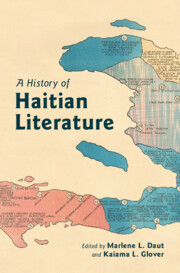Book contents
- A History of Haitian Literature
- Additional material
- A History of Haitian Literature
- Copyright page
- Contents
- Figures
- Contributors
- Chapter 1 Editors’ Introduction
- Chapter 2 Literature as Loot
- Chapter 3 Theater in Early Independent Haiti
- Chapter 4 “So all the world may know it”
- Chapter 5 Civil War, Guerre de Plume, and the Emergence of Early Haitian Periodical Culture
- Chapter 6 History, Politics, and Revolutionary Romanticism in Charles Hérard-Dumesle’s Voyage dans le nord d’Hayti (1824) and the Anonymously Published L’Haïtiade (ca. 1826)
- Chapter 7 The Cénacle and the Sacred
- Chapter 8 Émeric Bergeaud’s Stella
- Chapter 9 The Predicament of Civilization
- Chapter 10 The Politics of Disenchantment
- Chapter 11 Haitian Poetry in Creole
- Chapter 12 Some Causes of the Underdevelopment of Haiti’s Creole-Language Literature
- Chapter 13 Performing Rebellion and Re-membering Haiti’s Past and Present in Twentieth-Century and Contemporary Theater
- Chapter 14 Haitian Writers and the Forging of a National Voice through Periodicals in the Twentieth Century
- Chapter 15 “Arrêtez le monde! Je veux rêver”
- Chapter 16 Occupation-Era Literature in Haiti
- Chapter 17 Haitian Literature and the Dominican Republic
- Chapter 18 Marxism and the Moun Andeyo
- Chapter 19 Jacques Roumain, from Indigenism to Nationalism
- Chapter 20 For a History of the Novel of Haitian Tradition
- Chapter 21 Exile and Twentieth-Century Haitian Writing
- Chapter 22 The Zonbi as Episteme in Haitian Prose Fiction
- Chapter 23 Living Vodou
- Chapter 24 Papa Loko’s Dire Poétique in Twenty-First-Century Port-au-Prince-Based Haitian Poetry
- Chapter 25 Partisan Politics and Twentieth-Century Fictions of the Haitian Revolution
- Chapter 26 Haitian Women’s Fiction
- Chapter 27 Haitian Uses of the Erotic
- Chapter 28 Archiving Narratives of Maternal Loss and Queer Life in Haitian Fiction in the Wake of the 2010 Earthquake
- Index
Chapter 11 - Haitian Poetry in Creole
The Nineteenth-Century and Early Twentieth-Century Works
Published online by Cambridge University Press: 07 November 2024
- A History of Haitian Literature
- Additional material
- A History of Haitian Literature
- Copyright page
- Contents
- Figures
- Contributors
- Chapter 1 Editors’ Introduction
- Chapter 2 Literature as Loot
- Chapter 3 Theater in Early Independent Haiti
- Chapter 4 “So all the world may know it”
- Chapter 5 Civil War, Guerre de Plume, and the Emergence of Early Haitian Periodical Culture
- Chapter 6 History, Politics, and Revolutionary Romanticism in Charles Hérard-Dumesle’s Voyage dans le nord d’Hayti (1824) and the Anonymously Published L’Haïtiade (ca. 1826)
- Chapter 7 The Cénacle and the Sacred
- Chapter 8 Émeric Bergeaud’s Stella
- Chapter 9 The Predicament of Civilization
- Chapter 10 The Politics of Disenchantment
- Chapter 11 Haitian Poetry in Creole
- Chapter 12 Some Causes of the Underdevelopment of Haiti’s Creole-Language Literature
- Chapter 13 Performing Rebellion and Re-membering Haiti’s Past and Present in Twentieth-Century and Contemporary Theater
- Chapter 14 Haitian Writers and the Forging of a National Voice through Periodicals in the Twentieth Century
- Chapter 15 “Arrêtez le monde! Je veux rêver”
- Chapter 16 Occupation-Era Literature in Haiti
- Chapter 17 Haitian Literature and the Dominican Republic
- Chapter 18 Marxism and the Moun Andeyo
- Chapter 19 Jacques Roumain, from Indigenism to Nationalism
- Chapter 20 For a History of the Novel of Haitian Tradition
- Chapter 21 Exile and Twentieth-Century Haitian Writing
- Chapter 22 The Zonbi as Episteme in Haitian Prose Fiction
- Chapter 23 Living Vodou
- Chapter 24 Papa Loko’s Dire Poétique in Twenty-First-Century Port-au-Prince-Based Haitian Poetry
- Chapter 25 Partisan Politics and Twentieth-Century Fictions of the Haitian Revolution
- Chapter 26 Haitian Women’s Fiction
- Chapter 27 Haitian Uses of the Erotic
- Chapter 28 Archiving Narratives of Maternal Loss and Queer Life in Haitian Fiction in the Wake of the 2010 Earthquake
- Index
Summary
Discussing early Haitian Poetry written in Creole brings the researcher outside their usual field of investigation (literature) as they have to sift through antropological texts to locate those early texts. As a result, Oswald Durand’s Choucoune is considered as the first literary work written in Haitian Creole even though there is evidence of prior texts published and/or written in that language. Similarly, Georges Sylvain’s Cric? Crac! is the first collection of poems published by a Haitian writer. This chapter offers an overview of this early poetry in Haitian Creole, followed by a more detailed examination of Sylvain’s Cric? Crac! with a view to identifying the characteristic features of this poetry and establishing a connection with Haitian popular culture. The ‘bare-footed poets’ from the countryside are recognized for the influence left on their urban educated counterparts, particularly through the chante pwent, which appears to be a consistent feature of Haitian poetry in Creole up to today.
Keywords
- Type
- Chapter
- Information
- A History of Haitian Literature , pp. 194 - 213Publisher: Cambridge University PressPrint publication year: 2024

